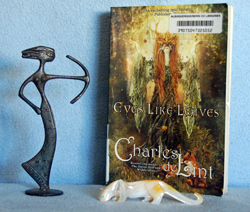And We’re Off!
This past week I started the sequel to Artemis Awakening. This is a big deal, an event to be celebrated with ice cream, preferably chocolate.

Awakened by Eyes Like Leaves
At least for me, starting a novel never seems to get any easier. This is true even if – as with this book – I am already acquainted with many of the main characters, have some idea of the setting, and even have a sense of what some of the major plot elements will be. Maybe even because of all these things, there’s this dreadful point where the characters simply aren’t talking to me. (See “Advice from Agatha” WW 1-26-11 for a bit more on this particular stage in writing a novel.)
This novel – untitled as of yet, so let’s call it AA2 – was particularly cursed by circumstances. Literally the day after I got the re-write of Artemis Awakening done and turned in to Claire Eddy at Tor and was walking out the door to go the airport to pick up my mom, who was coming for a Mother’s Day weekend visit, my phone rang. It was an ebullient David Weber, wanting to tell me that he’d finished debugging a timeline problem in our collaborative novel Treecat Wars (don’t ask; it’s fixed; we both love it) and he’d e-mailed me the manuscript and would I re-read it right away…
I told him I couldn’t right away because I was going to visit with my mom, but I’d get to it first thing on Monday. Except, when Monday came, I couldn’t, because my new computer was acting weird and had to be unhooked and sent back to the shop. (They fixed it.) So Weber expressed me a hard copy of the manuscript and I re-read it. Then (figuring out all the new programs on my newly returned computer), I sent him a long letter debugging the bugs that had crept in through the seams. (He stepped on them; they’re dead.)
But, by then, a couple of weeks had gone by, weeks that I’d spent in another universe with other people. That didn’t exactly make it easier to “hear” Adara and Griffin and Terrell and Sand Shadow, nor to “see” their world and their particular situation. I kept trying, but nothing was coming forth. Alan and I wrote back and forth a lot about other people’s stories, so I wasn’t exactly unproductive, but AA2 still was more theoretical than a reality.
As I’ve mentioned a few times, I’m a subconscious plotter. I don’t outline. If I try, all that happens is that inspiration rolls over and dies, like a butterfly with a pin through its heart. This can be frustrating but, after 22 published novels and 60 some short stories, I’ve learned not to fight it.
What gave me my breakthrough?
Well, the novel I’m currently reading is Eyes Like Leaves, by Charles de Lint. It’s an odd book because, although it was written sometime in 1980, it was not published until 2012. (If you want to know why, go read Charles’ excellent introduction to the novel. It’s worth it, especially as a window into the conflicting and complementary forces of market and art.) Charles says he did not heavily revise that long-ago manuscript, but he did polish. His biggest change was rewriting the opening chapter. He included the original version as an “extra” at the end.
It was in de Lint’s short introduction to this “extra” that I found the key to open my mental door.
I quote: “I wasn’t enjoying the first chapter. It just seemed to go on and on with back story, when all I wanted was for the book to start. Then I remembered a piece of advice from mystery writer Lawrence Block. He said that one should go ahead and write one’s novel, but when you’re done, just throw the first chapter away. Too many newer writers (such as I was when I wrote this book) feel they have to cram all this unnecessary information into the beginning pages of the book instead of just getting on with things.”
When I read this, I found myself getting all excited. Remember how I said that maybe it was because I had so many ideas about AA2 and where it was going that I was having trouble starting? Maybe I was trying to put too much in? Certainly, because I’d spent much of the last couple of months mostly in editorial mode (both with Artemis Awakening and Treecat Wars), rather than in creative mode, I was thinking in a very pragmatic fashion. I decided that, instead of thinking about foundations, I should go to where the story started. Almost as soon as I made that decision, I heard my characters talking.
“Forbidden, you say? That sounds promising.”
The conversation tumbled on, almost faster than I could scribble. The opening may not be precisely like this when the book is done, but that doesn’t matter. I’m there… The story has started. We’re on our way to places forbidden…
So, thank you, Charles, and thank you, Lawrence Block. And thank you, Griffin and Terrell and Adara. I can’t wait to see where we’re going next.





